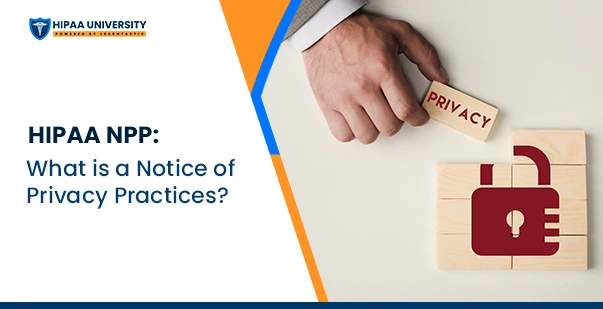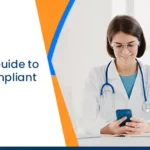HIPAA NPP: What is a Notice of Privacy Practices?

September 18, 2024
Table of Contents:
- Introduction
- What is a Notice of Privacy Practices (NPP)?
- Why do Healthcare Providers Need NPP?
- Components of an NPP
- When and How is an NPP Provided?
- How to Review and Understand Your NPP
- Benefits of NPP for Patients
- Consequences of Not Signing the NPP
- Wrapping Up
The Health Insurance Portability and Accountability Act (HIPAA) was introduced to keep personal health information safe and private. HIPAA ensures that patients’ details are protected, even as the healthcare system and technology continue to change. According to a survey, 48% of patients worry about how their medical data is used, which is why clear information through the NPP is so important.
One key part of HIPAA is the Notice of Privacy Practices (NPP). This document explains patients’ rights and tells them how their health information can be used or shared by healthcare providers. Whether you’re at a doctor’s office, hospital, or any healthcare facility, the NPP ensures that you know how your information is handled.
For healthcare providers, explaining what is NPP in healthcare to patients is not only a legal requirement but also a way to build trust. Read on to learn about the NPP in healthcare, its importance, benefits, and more!
What is a Notice of Privacy Practices (NPP)?
A Notice of Privacy Practices (NPP) is a document that explains how your health information is used and protected by doctors and other healthcare workers. It tells you what happens to your health details, like who can see them and how they are kept safe.
- Describes Information Use:The NPP explains how healthcare providers and related entities will use your health information.
- Outlines Privacy Practices:It details the privacy practices in place to protect your health information from unauthorized access or disclosure.
- Explains Patient Rights: The NPP informs you of your rights regarding your health information, such as accessing your records or requesting changes.
- Provides Contact Information: It includes contact details for the privacy officer or department so you can ask questions or file complaints about how your information is handled.
- Legal Requirement: Under HIPAA, healthcare providers are required to give you this notice and ensure you understand it before starting treatment.
Why do Healthcare Providers Need NPP?
An NPP is an extremely important healthcare document that details how a patient’s PHI is used, disclosed, and protected. The notice is to be given by healthcare providers, including hospitals, clinics, and individual practitioners. Major areas of interest normally covered under the NPP include, but are not limited to:
- Legal Compliance: Under HIPAA, providing an NPP is required. Failing to offer patients a clear, detailed NPP can result in significant fines and penalties.
- Building Trust with Patients: Transparency about how a patient’s health information is used helps build trust between the patient and the healthcare provider.
- Clear Communication of Patient Rights: The NPP allows healthcare providers to communicate important rights to patients, such as the right to access their health records or request changes.
- Protecting the Organization from Legal Risks: Proper distribution and explanation of the NPP can protect healthcare providers from legal disputes. If a patient feels their privacy was violated but had previously received the NPP outlining how their data might be used, the provider is in a stronger position to defend their actions.
- Reducing Misunderstandings: Having a well-written and clear NPP helps reduce misunderstandings between patients and healthcare staff regarding how information is handled.
Read More: Who is Responsible for Enforcing HIPAA Regulations?
Components of an NPP
A Notice of Privacy Practices (NPP) must include several key details to ensure that patients fully understand how their personal health information (PHI) will be used and what rights they have under HIPAA. These components are designed to provide transparency and protect patient privacy.
- Uses and Disclosures of Health Information: The NPP explains how health information may be used, such as for treatment, billing, and healthcare operations. It also outlines situations where information can be shared without patient consent, such as for public health purposes or legal requirements.
- Patient Rights: Patients have several rights regarding their PHI, which must be clearly stated in the NPP.
- Provider Responsibilities: The NPP outlines healthcare providers’ obligations, such as keeping health information private and only using or sharing it for authorized purposes. Healthcare providers must also inform patients about any breaches that may affect their privacy.
- How to File a Complaint: Patients must be informed about how they can file a complaint if they believe their privacy rights have been violated. The NPP provides the contact information for the healthcare provider’s privacy office and the Office for Civil Rights (OCR), where formal complaints can be submitted.
- Changes to the NPP: Any changes to the privacy practices must be reflected in an updated NPP, and patients must be notified of significant changes.
By clearly explaining these elements, the NPP helps patients understand their rights and how their health data will be handled, ensuring compliance with HIPAA and fostering trust in the healthcare system.
When and How is an NPP Provided?
Providers are required to give the patients the NPP at the first service encounter. It is usually given in written form, and it is often required that the patients acknowledge receipt. The NPP is also required to be posted in a location where it would be prominently displayed within the facility as well as on the provider’s website, where access would be easier. The following points discuss where and how should an NPP be provided in detail:
- First Visit or Service:
Healthcare providers are required to give patients the NPP during their first visit or encounter. This ensures that patients are informed about how their personal health information (PHI) will be handled right from the beginning.
- Electronic and Paper Formats:
The NPP can be provided in paper or electronic formats. Many healthcare providers offer it on their websites for patients to view or download. If healthcare services are delivered electronically, the NPP must also be provided in that format.
- Acknowledgement of Receipt:
Providers must make an effort to get the patient’s acknowledgement that they received the NPP, typically by having them sign a form. While a signature isn’t required for compliance, it helps ensure that the provider has proof of delivery.
- On Request:
Patients can request a copy of the NPP at any time, and healthcare providers must provide it promptly, either in paper or electronic form. This gives patients continuous access to their privacy rights and information usage policies.
- Posted in Facilities:
Healthcare providers must also display the NPP in a visible location within their facilities, such as at the reception desk, so that patients can easily read it when they enter.
How to Review and Understand Your NPP
Reviewing and understanding your Notice of Privacy Practices (NPP) is important for knowing how your health information is handled. Here’s a simple guide to help you navigate and understand your NPP:
- Read Carefully: Take your time to read the entire NPP document. It provides detailed information about how your health information is used and protected.
- Look for Key Sections: Focus on sections that explain how your information is shared, your rights, and how to make requests or complaints. These sections are crucial for understanding your privacy protections.
- Check for Contact Information: Find the contact details of the privacy officer or department within the healthcare organization. They can answer any questions you have about the NPP.
- Note Your Rights: Pay attention to the parts that explain your rights, such as accessing your records or requesting changes. Knowing your rights helps you take control of your health information.
- Ask Questions: If anything is unclear, don’t hesitate to ask your healthcare provider or the privacy officer for clarification. It’s important that you fully understand the information provided.
- Keep a Copy: Save a copy of the NPP for your records. This ensures you have the information on hand if you need to refer to it later.
- Enroll in a Training Program: Consider enrolling in a training program on HIPAA and privacy practices. This can provide a deeper understanding of how to handle and protect health information.
Benefits of NPP for Patients
NPPs provide patients with information about their rights over privacy, use of their health information, and those persons allowed to have access to it. These facts then convince the patients to make informed choices, demanding access to records, and hence, exercising their options on consent over the use and disclosure of their personal health information. Here’s how the NPP benefits you:
- Increased Transparency: The NPP clearly explains how your health information will be used and shared, helping you know what to expect.
- Better Control Over Your Information: You can request restrictions on how your health information is used or shared, which gives you more control over your data.
- Enhanced Privacy: The NPP ensures that your health information is kept confidential. Healthcare providers must follow strict rules to protect their privacy.
- Improved Access to Records: You have the right to access and review your medical records. This ensures that you can stay informed about your health and make any necessary updates.
- Clearer Understanding of Rights: The NPP outlines your rights regarding your health information. Knowing these rights helps you make informed decisions and take action if needed.
- Faster Resolution of Issues: If your records contain mistakes, the NPP provides a process for correcting them. This helps resolve any issues quickly and accurately.
Consequences of Not Signing the NPP
Signing the Notice of Privacy Practices (NPP) is important for ensuring your health information is protected. If you choose not to sign it, there can be some consequences. Here’s what you need to know:
- Limited Access to Care: Without signing the NPP, you might face difficulties in accessing certain healthcare services. Providers may need your signature to proceed with treatment or billing.
- Increased Risk of Miscommunication: Not signing could lead to misunderstandings about how your health information is used and shared. This might affect how your care is managed.
- Lack of Legal Protections: By not signing, you might miss out on important legal protections regarding the privacy and security of your health information.
- Inability to File Complaints: If issues arise with how your information is handled, you might have limited ability to file complaints or address concerns if you haven’t signed the NPP.
- Possible Delays:Providers might delay services or require additional steps to ensure your information is protected, potentially leading to delays in your care.
Read More: What Are the Consequences of a HIPAA Violation?
Wrapping Up
Notice of Privacy Practices is a crucial document that helps protect your personal health information. It explains your rights, the benefits of knowing how your information is used, and how to review the document properly.
By understanding what NPP is in healthcare, you ensure that your health information is handled with care and respect.





